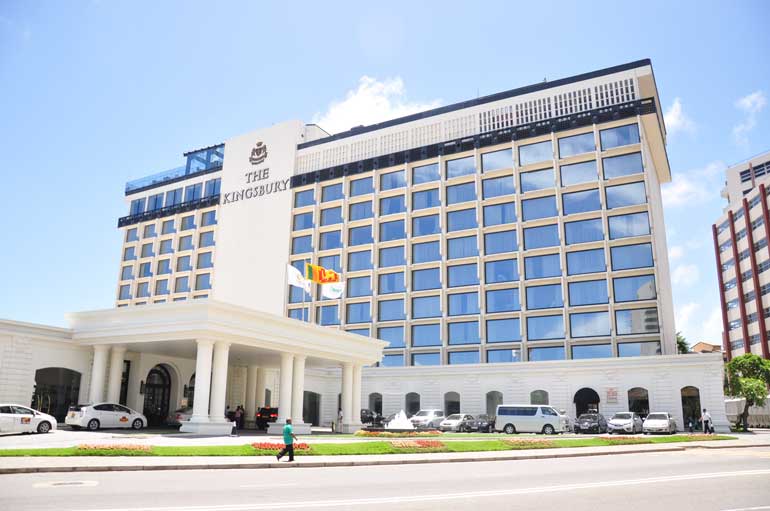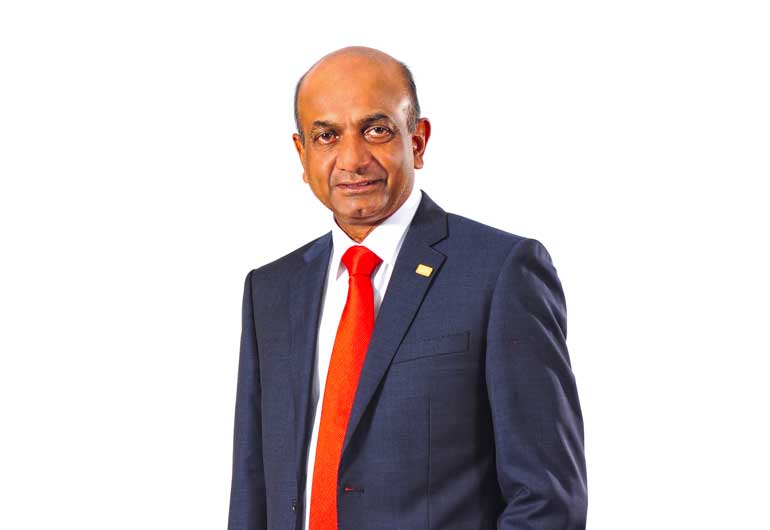Wednesday Feb 25, 2026
Wednesday Feb 25, 2026
Thursday, 27 August 2015 00:00 - - {{hitsCtrl.values.hits}}
''Wins Luxury Travel Guide UK’s Hotel of the Year 2015
and Restaurant of the
Year 2015 awards''


The Kingsbury Managing Director Lalin Samarawickrama
By Madushka Balasuriya
Q: You have been at The Kingsbury since its inception in 2012. Can you briefly describe the journey to this point?
A: We spent a colossal sum of money, approximately $ 22 million on the refurbishment and the rebranding. As you know this was earlier the Intercontinental, then it became Continental, then we totally refurbished the property, rebranded it and called it The Kingsbury. Of course from there on, our main intention was to be one of the best city hotels in the whole of Colombo. With competitors like Hilton, Cinnamon Grand, Cinnamon Lake and Galadari, which have been around for a very long time, we had to make sure we got our act together in order to be in the front line. The first year of operations, which also included a certain period when the hotel was shut down, we had a loss of Rs. 500 million having budgeted for a $ 22 million refurbishment, so we had to absorb that as well.
Then the first year in to full operation we made a Rs. 32 million profit. So we transformed the losses into profitability within one year. Then the second year which ended last March we made a profit of Rs. 300 million. This is because we had some strategic planning and also we concentrated heavily on the brand development: The Kingsbury. That has been the success of turning the hotel around from a loss incurring to a profitable one within a very short period of time.
Now again, this financial year, looking at the five to six months of operation we see a tremendous gain from last year as well. Our revenues have improved and I’m absolutely positive that our profitability is going to be much more than what we had before, so we are expecting about a 15-20% growth from last year.
Q: What would you say is the main factor behind your success?
A: We have been having our own identity as The Kingsbury. We have not been looking at the others, we have been concentrating on a set plan and taking this property forward, not only at local level but we have been focusing this property at international level, and that is where these sort of awards have come in. Now the year before (2013) we won at the Luxury Hotel Awards for best in Indian subcontinent region. So like that the hotel and the brand are getting recognised and this is where we have succeeded in targeting The Kingsbury to that level of standard, maintaining very high international levels.
Q: Is there an emphasis on striving for awards such as this?
A: Today, I have to be very frank, there are awards and awards; you can buy awards. Now this company is offered awards every month, but that is not through actual performance. It is because they go on the web and pick and choose the good companies and they say, “Look here, you have won this award, please come and collect it”. And at the end it says “it will cost you 4,000 euros”. That is not what we want; that way I could have filled my cabinets with awards and be grinning all over but that is not what we want. We are a little different. When you walk into The Kingsbury and enjoy the facilities, you should be able to experience it yourself. In simple terms, we don’t put on an act. We try to do our best, but we do not act.
Q: Several criteria were taken into consideration for this award. What would you say is the most difficult criteria to fulfil?
A: When you go into a venture like this, where you have to be mindful of the fact that there’s a lot of competition around that has been established prior to our arrival…we focused heavily on our service standards; then of course the quality. At the same time we had to be very careful with the pricing; we had to produce something that was value for money to get in to that market share. Of course then we also had to have a product that was consistent.
So those are the areas that we have been concentrating on, with a lot of emphasis put on training and development. We spend a lot of money on that every year, because it is the customer that gives us the feedback; if we give a good service and if we give good value for money and then you have a good product that is acceptable, those are the key areas. We have been sticking to the basics more than anything else.
Q: Can you elaborate on the in-house training you offer your staff?
A: Not only in-house training; we had hired international training companies, namely William Angliss, who are specialists in training hospitality personnel. So we have been having a heavy budget on training and that has been one of the success stories. Also the facilities we have given our staff; we have been concentrating on that as well.
Q: Is there a considerable gap between the quality or calibre of hospitality personnel local hotel schools produce and what you expect?
A: With all due respect to the Ceylon Hotel School, I say this because I’m not a product of the Ceylon Hotel School; my training was abroad in England. Now when you look at the two systems, we don’t have the in-depth training or the technical know-how in comparison. When you come out, they teach you not only the basics of hospitality, they teach you how to use a knife and a fork and the lingo. The lingo that you use in the hospitality trade is also different. These are the finer points of hospitality, so this language also has to be taught. So to summarise, the training setup has to be a lot better than what we have at the moment. Why do they prefer foreign managers and executives to work in hotels here? Because there is a shortage of experienced and qualified people in this part of the world; what we have is ok for the resorts but city hotels are a different cup of tea altogether. We have a problem because the guys who are qualified at that level don’t want to come back from their posts abroad.
Q: How difficult is it to keep to the standards that you have set in the long term?
A: This is a 24/7, 365 days of the year business. It’s a constant hands-on business and this is what everybody will have to do and what they are doing here. You have to ensure that your service levels and standards are maintained at the highest levels at all times. And there is another factor where people get bored so you have to get rid of the boredom; you don’t want to go to the same restaurant and eat the same food maybe three times a week, so you have to give them something different.
We have to be very innovative in our ideas for running this establishment and that is what we have trained our people to do. That is why our outlets, especially the restaurants, are very popular. We have actually created a name for our food more than anything else, so going forward while there will be competition we have our own ideas and a set plan to develop our own setup.
Q: With the amount of money invested in training your staff, how difficult is it to retain them?
A: It’s difficult, the turnover is very high. The temptation is there for people to go abroad. They’re not pinched by the other local hotels here but they get fantastic job opportunities in places like Maldives, the Middle East, sometimes in the UK, but we’re very, very proud of the fact that we are training people. As an establishment we have to allocate a certain amount of money for training because we have to look at the country as a whole more than being selfish ourselves, but what we’re doing is training them and we’re improving their standards. Especially when your service charge component goes up then that is an incentive for them and when your annual bonuses come in, those are incentives for people to stay behind. Actually, even during the time the hotel was closed for refurbishment the staff was retained and paid their salary including the service charge. The staff is an asset, we value them very much.
Q: What’s the next big goal for The Kingsbury?
A: You see the problem is, you can only develop up to an extent and then you come to a saturation point; especially when you have 239 rooms. You can say your maximum revenue and your profitability is ‘this much’. So then you have to decide, “Ok do you want to have another The Kingsbury somewhere else? Or put up another 120 rooms within The Kingsbury? Or are you happy with revenues and profitability at the end of the year?” You reach a maximum point, after that it’s a matter of maintaining and maintaining and maintaining. So our intentions are very clear, we want to reach the maximum; I think in another two years’ time we can do that. And then perhaps in the mean time we may go into various other ventures. Now we have plans for managing apartments within the city in Colombo; we have discussed terms with the people who own Platinum 1 and we will have something similar to what Hilton Residencies are having, and take The Kingsbury brand to the Platinum 1 apartment complex.
Q: Are there any plans in the future to take The Kingsbury brand overseas?
A: Yes, we are investing in the Maldives. We are hoping to invest in the Maldives within a very short period of time. We want to put up a 150 bedroom resort in Malé.
Q: Will that be under The Kingsbury brand?
A: It will be under Hayleys, but The Kingsbury and Amaya will be investing in that property with the help of Hayleys. So we are going international, but the question is at the end of the day whether you go international or local, how much money are you going to make? If it is more lucrative for us to be in the local market, then we will be looking at that option more than going international. We don’t want to go international just for the sake of it; we will be looking at returns as well. That is how we planned The Kingsbury and will do with any other business for that matter.
Pix by Sameera Wijesinghe